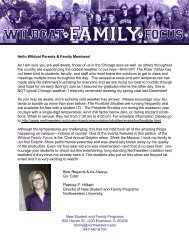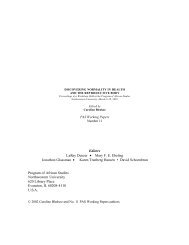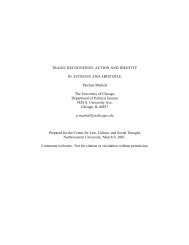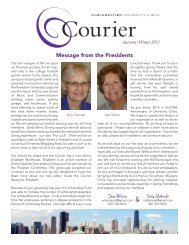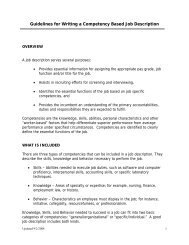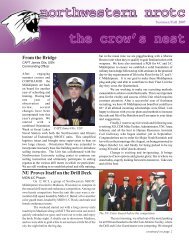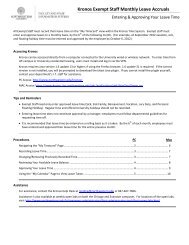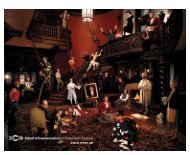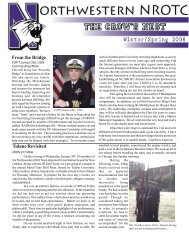Artistry Permits and Custom May Ordain - Northwestern University
Artistry Permits and Custom May Ordain - Northwestern University
Artistry Permits and Custom May Ordain - Northwestern University
Create successful ePaper yourself
Turn your PDF publications into a flip-book with our unique Google optimized e-Paper software.
222 G. de San Bernadino, Itinerario, in SD, 157.<br />
46<br />
those still extant. Moreover, they were unique in their capacity to announce the presence<br />
<strong>and</strong> extend the will of a ruler over great distances. De Barros wrote in the sixteenth<br />
century that when the Sultan of Malindi’s siwa sounded, “the mountains <strong>and</strong> valleys<br />
repeated with their echo [the sultan’s] pleasure.” 222 Because of their associations with<br />
nodes of power, the instruments of office, much like cloth, became materials of<br />
extraordinary political power <strong>and</strong> often functioned as symbols of political contention.<br />
Royalties invested great amounts of wealth in public display, typically in the form of<br />
festivals or performances of ritual sacrifice. Upon exiting his palace, the Sultan of Malindi<br />
was greeted by the “richest <strong>and</strong> most honorable people [who] had a sheep, <strong>and</strong> when the<br />
king mounted the horse they slaughtered the said sheep, <strong>and</strong> the king rode over it on<br />
horseback.” 223 One Portuguese visitor reported that “they did [this] for ceremony <strong>and</strong><br />
enchantment, <strong>and</strong> the custom is thus in Zambochob [the coast of East Africa, or<br />
Zanzibar].” 224 Aromatics were used at ritual sacrifices, in a fashion similar to that of<br />
incense-burning at royal tombs, to enhance the purity of office. An observer at Malindi<br />
noted that “the king . . . came down to the shore <strong>and</strong> ordered the priests to sacrifice a<br />
sheep, over which he passed accompanied by a great number of people carrying perfume<br />
pans.” 225 And in 1500 the Sultan of Malindi ordered “many women . . . to meet [visitors]<br />
with vases full of fire, in which were placed so many perfumes that the odours pervaded<br />
the l<strong>and</strong>.” 226 At Kilwa, “when the King came out from his court, they threw water <strong>and</strong><br />
small branches over his head, <strong>and</strong> they were very merry <strong>and</strong> clapped their h<strong>and</strong>s, <strong>and</strong> sang<br />
<strong>and</strong> danced.” 227 Further, the Sultan of Domoni in Nzwani sponsored “large <strong>and</strong><br />
hospitable” public festivals, “at which a whole town [would] at one time be treated.” 228<br />
Royal power was publicly affirmed through ritual purification <strong>and</strong> by funding public<br />
display. 229<br />
223 The rarity of horses in East Africa made them symbolic of the unique capabilities of the state to consume.<br />
Muhammad al-Rukn rode through Kilwa on horseback after his coronation. DPMAC 1:527. Horses were also used<br />
in “sham fights” at Malindi in 1498. Da Gama, in SD, 54-5. On the trade in horses to Kilwa, Malindi, Barawa,<br />
<strong>and</strong> Mombasa see T. Pires, Suma Oriental. Vol.1. London, 1944. 14.<br />
224 Cabral in SD, 62. P. Caplan, in Choice <strong>and</strong> Constraint, discusses the slaughtering of sheep before the launching<br />
of a ship in Mafia.<br />
225 Da Gama’s Second Voyage, in SD, 73.<br />
226 Cabral in SD, 62.<br />
227 Calcoen: A Dutch Narrative of the Second Voyage of Vasco da Gama to Calicut (printed in Antwerp c. 1504). Ed. J.<br />
Berjeau. London, 1874.<br />
228 J. Ovington, A Voyage to Suratt. New Delhi, 1975. 54.<br />
229 See the Pate Chronicle (multiple versions) for the use of festival sponsorship as a tool for power negotiation.<br />
On aromatics <strong>and</strong> Swahili notions of ritual purity in general, see L. Donley-Reid, “Life in the Swahili town house



